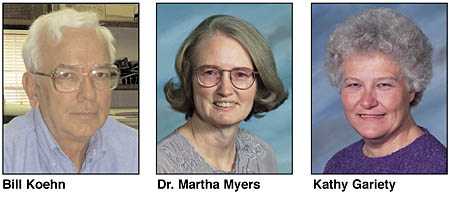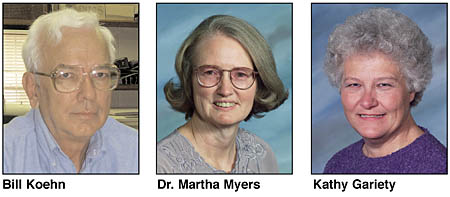
Yemeni loved slain Americans Now we mourn [Archives:2003/01/Front Page]
January 6 2003

It was a week of more grief in Yemen.
Two days after the political assassination of YSP official Jarallah Omar, three American humanitarian aid workers at Jibla Baptist Hospital were murdered.
And for many here, the American missionaries at a Baptist hospital were not seen as Christian intruders in a Muslim land, but as friends to the residents of this poor town in the rugged hills of southern Yemen.
That became clear during funeral ceremonies Tuesday, as local Yemeni lined up by the hundreds to say goodbye to their American friends.
Two of the dead were buried in a cemetery in the hospital compound. They were Dr. Martha C. Myers, 57, of Montgomery, Ala., who had worked in Yemen for 24 years, and the hospital director, William E. Koehn, 60, a Kansas native who had planned to retire next October after 28 years at the hospital.
The body of the third victim – Kathleen A. Gariety, 53, of Wauwatosa, Wis., who had worked in Yemen for 10 years – was flown to the United States Thursday.
“Today was very sad for all of us,” said Malka al-Hadhrami, a Jibla resident who said she had worked as a clerk for Dr. Myers for 18 years. “And what made it even more sad was that we couldn’t participate in the burial.”
Samira Abdullah said Dr. Myers treated her during her first pregnancy, when she was confined to bed for months to avoid miscarrying.
“Every day, she looked after me, she used to come to my house, until I was able to stand and walk without endangering my pregnancy,” Ms. Abdullah said, cradling her 2-year-old son in her arms. “Without her, I wouldn’t have Ali. She was a friend more than a doctor.”
In the attack on Monday, the gunman slipped past the hospital’s weapons check, hiding his rifle. He then shot the victims in the head and wounded a pharmacist, Donald W. Caswell, 49, of Levelland, Tex., who had been in Yemen for 18 months.
The suspect in the case, Abed Abdul-Razak al-Kamil, was arrested after the incident. Yemeni investigators say they suspect he has ties to Al Qaeda. Jibla residents stressed that Mr. Kamil was an outsider, from Sana’a, the capital.
In Jibla, unpaved streets wind past small houses without running water. Water is hauled on donkeys from a dam. The residents make their living as farmers, growing wheat, corn, oranges and vegetables.
Founded in 1967 by James and June Young, a Southern Baptist couple from Louisiana, the hospital treats more than 40,000 patients annually, providing free care to the poor, according to the Southern Baptist International Mission Board.
Mourners at the gates said that even when fees where charged, they were minimal. A visit with a doctor was about 6 cents, they said – about a fourth the rate at the private clinic in the nearest large town. The average Yemeni makes about $350 a year, according to the World Bank.
Families of the victims expressed their grief, but also the love the three victims had for the Yemeni.
“She loved the people very much. She felt like that was home,” Ira Myers said of his daughter, Dr. Martha.
Ira Myers, the retired director of the Alabama Department of Public Health, said Yemen had been his daughter’s home for 24 years. “She went over when she was a senior in medical school. She decided that’s where she wanted to be,” he said.
“She loved the people very much,” Mr. Myers said. “She felt like that was home. She had the opportunity to talk to the native women. That would not have been possible for a male doctor in that culture. She delivered lots of babies.”
He said his daughter also helped UNICEF with immunization programs.
“We are concerned for the people who have been getting their care from Martha and the others at the hospital. Now where do they go?” asked Mr. Myers, 78.
Kathleen Gariety’s family had tried to persuade her to stay in Wisconsin this summer, but the Baptist aid worker from Wauwatosa, a suburb of Milwaukee, had insisted on returning to Yemen.
“We tried hard to get her to stay home,” said her brother, Jerome J. Gariety Jr. of Colgate, Wis. “She wouldn’t hear of that.
“I didn’t want her to go, but I think what really took her back was the children. She loved the children,” he added.
Koehn and his wife, Marty, had been in Yemen since 1975, his brother, Randal Pearce, said outside his home in Mansfield, Texas, about 15 miles southeast of Fort Worth.
“We have found them to be gracious and kind,” Pearce said of the Yemenis. “Otherwise, Bill and Marty would never have spent their lives serving there.”
Meanwhile, Yemeni authorities upgraded security measures around embassies and hotels in Sana’a as a precautionary move to avert possible attacks by dormant cells of Osama bin Laden’s al Qaida militant network.
Memorial services in the United States for the two missionaries buried at Jibla Baptist Hospital were scheduled for Thursday in Burleson, Texas, for Koehn and in Mobile and Montgomery, Ala., for Myers. Gariety’s body is being flown to her native Wisconsin.
“The gunman perpetrated a physical act of causing death, but these people willingly gave their lives because they loved God – and loving God, they loved the Yemeni people,” said missionary spokesman John Brady in comments on the day Koehn and Myers were buried. “They loved where they were.
“The last thing Bill Koehn said to me was, ‘I live in the most beautiful place on the earth,'” remembered Brady, who leads Southern Baptist International Mission Board work in northern Africa and the Middle East.
Eyewitness Hassan Ali Ahmed was present just after the shooting.
“I found people running in all directions,” he said. He also saw the victims’ last moments alive.
“All of us in the hospital were shocked, we never imagined something like this could happen.
On behalf of myself and all the people of Jibla, we are so sorry for what happened and we condemn such acts. We did not see anything bad from those Americans, in fact they were there to help us and they used to distribute food supplies to the needy and visit the poor.”
Rashid Al-Mashriqi, of Jibla described what he saw:
“The hospital has given lots to the people of Jibla and it had helped poor people and needy students with medicine and even note books and pens. Even they gave them food such as rice, flour and wheat,” said Rashid Al-Mashriqi, a resident of Jibla.
“Slaughtering people has never been tolerable regardless of the reasons or motives. I am sad about what happened in Jibla,” said a visitor from Holland.
“I am a person who has extensive experience in living in Yemen as I have visited many places and moving from city to city without fearing anything, but in all my life, I have never seen such a ruthless killing scene and I hope it wouldn’t be repeated,” she said.
Read the history of Jibla Baptist Hostipal
——
[archive-e:01-v:2003-y:2003-d:2003-01-06-p:./2003/iss01/front.htm]


